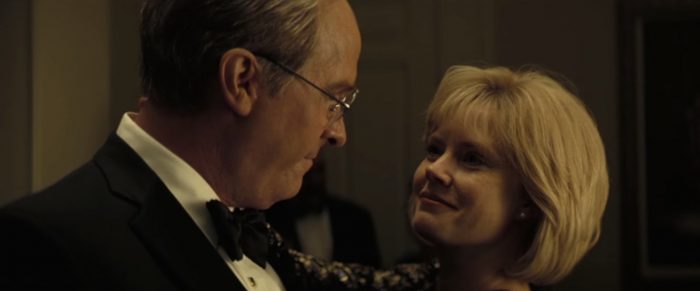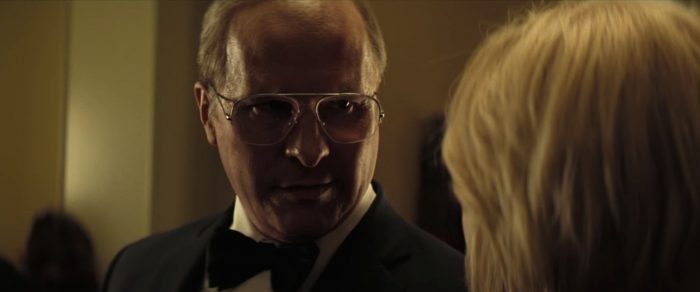Devourer Of Planets: Dissecting The Nuance-Free Yet Brilliant Filmmaking Of Adam McKay's 'Vice'
Vice bides its time, at least at first. It opens with a brief, Paul Greengrass-style glimpse of the Situation Room on 9/11. Accompanying this cinéma vérité are snippets of all the war and torture that would follow; Adam McKay, now on a roll after The Big Short, is as much a documentarian or video essayist as he is a fiction filmmaker, setting the stage for events that we, the public, are all too familiar with.However, the film's opening credits don't arrive until 12 minutes later. In the interim, Dick Cheney's (Christian Bale) drive is established through biopic pastiche. His rustic beginnings, his run-ins with the law, his wife Lynne (Amy Adams) threatening to leave him if he doesn't get his life together. Later, as the film grows more tongue-in cheek, Cheney is brought up to the White House by Donald Rumsfeld (Steve Carell). Here, Cheney's ethos is crystalized in the form of a conversation between Henry Kissinger and President Richard Nixon, as they plot to bomb Cambodia.Cheney, standing outside Kissinger's office, imagines not the specifics of this secret meeting, but its destructive impact and the symbols power that will it into being. He pictures, framed by a haze of soft focus, brief flashes of smoke casually filling the room as cuff-links, polished shoes and Presidential insignia do the talking.This vision echoes several moments from earlier in the film, the first a few scenes prior. The camera — ascending a flight of stairs and arriving in the middle of a room, as if rising from Hell — captures Cheney laying eyes on Rumsfeld for the first time. As Rumsfeld takes the stage to address a hall of interns, the camera pushes in slowly on Cheney. His wry smile making the film feel momentarily like it could've been a romantic comedy, were its contrast ratio not so harsh.Cheney isn't in love with Rumsfeld so much as he is in love with the idea of him — specifically, the opportunity he holds. Rumsfeld is a stepping stone, and as he exits the scene outside Kissinger's office, Cheney's focus shifts to the new form of power just outside his grasp. After a Hellish glimpse at the mayhem in Cambodia, the camera pushes in on Cheney once more, as he stands frozen, transfixed, and leaning ever so slightly. The second moment echoed by the Kissinger vision comes during the film's near-parodic initial minutes. As Lynne reprimands Cheney for his drinking, she describes — and briefly flashes back to — a moment from her childhood, one that unfolds on the other side of a doorway. Filmed through a similar soft-focus haze with obscured edges, the scene depicts Lynne's drunk, abusive father Wayne (Shea Whigham) wielding power over her helpless mother. Cheney eventually stands up to Wayne, but the dots between the two men are firmly connected. Decent as Cheney may be to those around him, he's the same power-drunk bastard Lynne always feared — only now, Lynne is on the side of power.The third time Cheney's mind's eye lands on a hazy aside— images of torture in Guantanamo and other abuses of power — George W. Bush (Sam Rockwell) has just been elected. Cheney stands motionless, firm and upright at the door to the Oval Office. His body is silhouetted, his face obscured like something alien. He looks back on his first phone call from the White House, to his wife and daughters decades earlier; there is a strange connection brewing between this monster and his humanity, though it isn't made clear until the film's closing title cards — both times they arrive.The first time is a gag occurring forty-five minutes into the film, shortly after Cheney's daughter Mary (Alison Pill) comes out as gay. The fake-out sees the return of the film's biopastiche feel, as Cheney turns his back on his political ambitions for Mary's sake, and retires to an idyllic life of contentment. Nicholas Britell's triumphant horns play him out as the credits begin to roll, but this alternate ending is cut short by a ringing telephone, as if to awaken one from a dream. The call is from George W. Bush. The second and final set of end-title cards arrive just after Mary's sister Liz (Lily Rabe), in pursuit of her own political ambitions and with Cheney by her side, speaks out publicly against gay marriage, seemingly with Cheney's blessing. Mary is crushed.Vice spends countless moments humanizing Cheney — his appreciation for Lynne, his levity on his deathbed, and his genuine love for his daughters — only to yank it all away in favour of his ambition. His story could have ended after his failed Presidential bid, but he was tempted back into the fray nearly a decade later. The film's Dick Cheney is undoubtedly, painfully human, but he willingly sheds his humanity amidst the pursuit of power.Cheney's constant temptation is evident in how he's lit. His aforementioned reflective moment outside the Oval Office, in which he's consumed by darkness and scored by Britell's blaring opera, is a point of culmination, the kind McKay and cinematographer Greig Fraser build to throughout. When Cheney first asks for intel to be un-redacted (a scheme to find excuses to invade Iraq), his eyes fall into shadow. When he walks into George H.W. Bush's party — the same party where he first sees a drunken George W., setting up his later ploy — the glares of fear and admiration around him, when pointed out by Lynne, get Cheney so horned up for power that light itself bends around him.
 "No one has shown the world the true power of the American presidency," Lynne says.From an objective vantage, there's nothing out of the ordinary about Cheney or how he's lit. His closeup however, using two rear key-lights with little fill from the front, brings us into his perspective, as his hunger for power grows from within.Lynne however, who speaks Cheney's ambition into being, is backlit perfectly in his reaction shot, as if she's blocking the light from his face. Lynne is a fuel for Cheney's power-trip, furtjer dramatized in the film's Shakespearean aside, a conspiration a la Macbeth. Once again, the center of Cheney's face falls into shadow, and the scene culminates in a kiss scored by thunder. Their lust extends far beyond one another.Bale leans in to this power-hungry persona, augmenting what could have been mere impersonation with a beastly growl. Except for brief moments in which he towers over George W. Bush, Bale's Cheney is sluggish — and slug-like, in the Jabba the Hutt sense of the word — leaning uncomfortably in every seat. Bale is disgusting to look at because he feels constantly disgusted with himself; a smug, self-aware cadence for a film hinging, perhaps smugly, on its own self-awareness.The narrator Kurt (Jesse Plemons) is a fictitious stand-in for "the people," a soldier who fights Cheney's unjust wars and, eventually, gives his life for him. He helps replace Cheney's blackened heart, prolonging his life as the film cuts to American soldiers either returning home in coffins, or torturing Iraqis at Abu Ghraib. A cosmic irony.Vice has no pretense of nuance; it posits a lack of political belief as inherently more compatible with power, rather than framing any beliefs themselves as corrosive. In the process, it sidesteps the very real structural ills that inform the events it chronicles. Though, for a story so distinctly nuance-less, its on-the-nose, hammer-on-head strategy feels appropriate.It's the story of one of modern history's greatest monsters, one Richard B. Cheney, and rather than picking just one extreme approach — humanizing, or cartoonishly evil — the film indulges in both. It dramatizes how a person can exist as both, and the forces that flip the switch. Dick Cheney is human, sweet, even loving, but all that fades away in the face of unchecked might. He is "Galactus, devourer of planets."
"No one has shown the world the true power of the American presidency," Lynne says.From an objective vantage, there's nothing out of the ordinary about Cheney or how he's lit. His closeup however, using two rear key-lights with little fill from the front, brings us into his perspective, as his hunger for power grows from within.Lynne however, who speaks Cheney's ambition into being, is backlit perfectly in his reaction shot, as if she's blocking the light from his face. Lynne is a fuel for Cheney's power-trip, furtjer dramatized in the film's Shakespearean aside, a conspiration a la Macbeth. Once again, the center of Cheney's face falls into shadow, and the scene culminates in a kiss scored by thunder. Their lust extends far beyond one another.Bale leans in to this power-hungry persona, augmenting what could have been mere impersonation with a beastly growl. Except for brief moments in which he towers over George W. Bush, Bale's Cheney is sluggish — and slug-like, in the Jabba the Hutt sense of the word — leaning uncomfortably in every seat. Bale is disgusting to look at because he feels constantly disgusted with himself; a smug, self-aware cadence for a film hinging, perhaps smugly, on its own self-awareness.The narrator Kurt (Jesse Plemons) is a fictitious stand-in for "the people," a soldier who fights Cheney's unjust wars and, eventually, gives his life for him. He helps replace Cheney's blackened heart, prolonging his life as the film cuts to American soldiers either returning home in coffins, or torturing Iraqis at Abu Ghraib. A cosmic irony.Vice has no pretense of nuance; it posits a lack of political belief as inherently more compatible with power, rather than framing any beliefs themselves as corrosive. In the process, it sidesteps the very real structural ills that inform the events it chronicles. Though, for a story so distinctly nuance-less, its on-the-nose, hammer-on-head strategy feels appropriate.It's the story of one of modern history's greatest monsters, one Richard B. Cheney, and rather than picking just one extreme approach — humanizing, or cartoonishly evil — the film indulges in both. It dramatizes how a person can exist as both, and the forces that flip the switch. Dick Cheney is human, sweet, even loving, but all that fades away in the face of unchecked might. He is "Galactus, devourer of planets."
